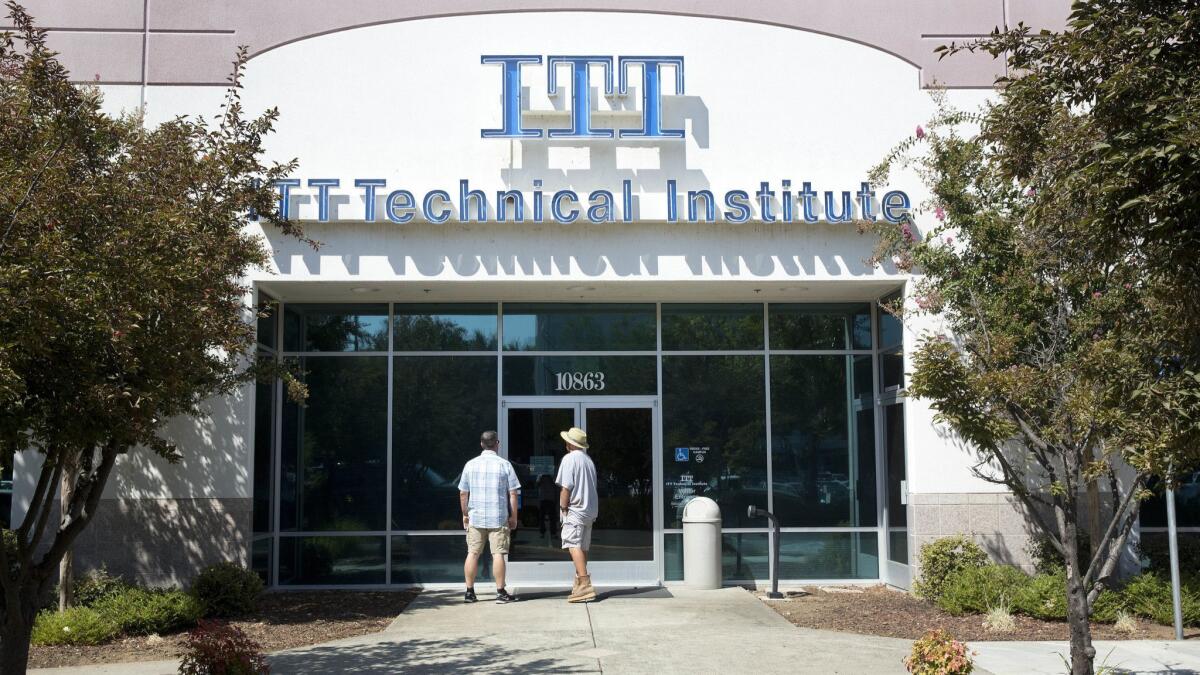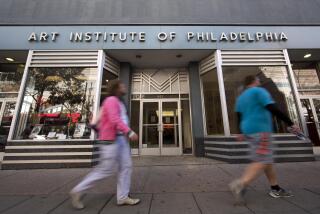Defunct for-profit college firm ITT’s former executives settle fraud charges

Former top executives at ITT Educational Services, the parent company of defunct ITT Technical Institute, have settled fraud charges with the Securities and Exchange Commission, avoiding a trial that was slated to begin Monday.
A judgment order entered Friday puts to rest civil fraud charges filed in 2015 against former ITT Chief Executive Kevin Modany and former Chief Financial Officer Daniel Fitzpatrick. The charges accused them of deceiving investors about high rates of late payments and defaults on student loans backed by the company.
Neither Modany nor Fitzpatrick admitted or denied wrongdoing, but they agreed to pay penalties of $200,000 and $100,000, respectively. Both are barred from serving as officers and directors of public companies for five years. The agreement arrives nearly a year after SEC commissioners rejected an earlier settlement with the executives.
“Holding individuals accountable — particularly senior executives — is a critical focus of our enforcement program,” Stephanie Avakian, co-director of the SEC’s division of enforcement, said in a statement. “These settlements, entered into on the eve of trial after years of litigation, reflect our commitment to this accountability.”
Attorneys for Modany did not immediately respond to requests for comment.
Fredric D. Firestone, one of the attorneys at McDermott Will & Emery representing Fitzpatrick, said his client “is pleased to put this matter behind him.”
In 2015, the SEC accused ITT’s top brass of making secret payments on delinquent accounts to delay defaults instead of disclosing the tens of millions of dollars in impending losses to investors. Executives assured investors in conference calls that the programs were performing well, while ITT’s obligations to pay out on soured loans began to balloon, according to the complaint.
ITT created two in-house student-loan programs as private lenders retreated from the market at the height of the 2008 financial crisis. Banks stopped extending credit to students at for-profit colleges because of their historically high default rates.
To get investors to finance the in-house loans, ITT offered a guarantee to limit the risk of students not repaying the debt. If a certain percentage of loans soured, the company agreed to cover the principal, interest and fees.
Because ITT kept the loan programs off its balance sheet, investors did not have direct information about the performance of the debt. When students began defaulting en masse around 2011, all investors could rely on was the company’s word, according to the SEC complaint.
The following fall, ITT paid $8 million as guarantee obligations came due, but executives allegedly failed to inform investors the company was facing an additional $30 million in payments at the end of that year. The SEC says the company used accounting tricks to hide the impending financial trouble. It was not until 2014 that ITT reported more than $60 million in charges related to its loan programs, a revelation that sent its stock plummeting.
At the time the SEC charges were filed, ITT issued a statement denouncing the allegations and insisting the evidence did not support the regulators’ claims. The company said it consulted with an independent auditor to confirm its accounting was appropriate.
The company ceased operations at all of its ITT Technical Institutes in 2016 after the Education Department curtailed its access to federal loans and grants when an accrediting body threatened to pull the school’s accreditation amid mounting lawsuits and investigations.
Days after shutting down 137 campuses and leaving 35,000 students and 8,000 employees in the lurch, the company filed for bankruptcy protection to liquidate its business. That bankruptcy case continues to drag on as creditors, federal regulators, state attorneys general, jilted employees and students lay claim to the remaining assets.
Earlier this year, a federal judge recognized a $1.5-billion claim that ITT Tech students who attended the school between 2006 and 2016 asserted against the company for breach of contract and consumer protection violations. That means if there is money in the estate to pay unsecured claims — debts that are not assured payment — at the end of the bankruptcy, students would receive a share.
“It is outrageous that the executives get to walk away with a sweetheart deal from the SEC while ITT students will be lucky to get a sliver of justice in ITT’s bankruptcy and the Department of Education refuses to cancel students’ fraudulent debt,” said Toby Merrill, an attorney representing the students in the bankruptcy case, who is also director of the Project on Predatory Student Lending at Harvard Law School.
Douglas-Gabriel writes for the Washington Post.
More to Read
Inside the business of entertainment
The Wide Shot brings you news, analysis and insights on everything from streaming wars to production — and what it all means for the future.
You may occasionally receive promotional content from the Los Angeles Times.









